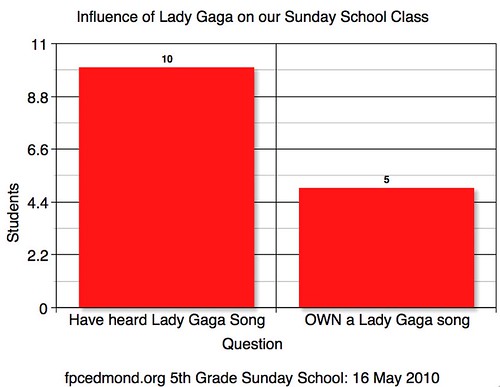Today in our fifth grade Sunday school class, we discussed Edmond 6th grader Grayson Chance and his experiences on the Ellen show Thursday. To start, the students brainstormed answers to three different questions in pairs, and then we shared/discussed them together. (Turn/Pair/Share activity) Each time students had 45 seconds to brainstorm and write down ideas, and then we shared/discussed aloud. Remember these are the results of what STUDENTS brainstormed, not my OWN ideas / lesson notes.
What do you know?
Greyson Chance
- Going out with my friend McKenna
- On Ellen Show Thursday
- Goes to Cheyenne Middle School in Edmond, Ok
- 12 years old
- 6th grade
- sings
- plays piano
- sang Paparazzi by Lady Gaga on Ellen
- writes and sings his own songs
- mom texted him in Math class, saying Ellen called
- talent show for 6th graders at church
- dad videoed his performance and his family told to put on youtube
- he is male
Lady Gaga
- real name is Stefani
- coming to OKC and Grayson will be her opening act
- changes her hair/style very often
- she sings
- she is/looks weird / unique / different
- she wears wigs
- has odd shows (lots of special effects)
- natural hair is brown
- she called Grayson on Ellen
- she is female
Before our third turn/pair/share brainstorm, I surveyed our class of 11 on the following 2 questions:
– How many of you have heard at least 1 Lady Gaga song before?
– How many of you personally OWN at least one Lady Gaga song on your iPod, as a CD, on your own music player?
These were the results:

(Created with the NCES free “Create a Graph” website)
If you cannot view the Flickr image above at your location, here are our results shared as text:
- 11 5th graders here
- 10 of 11 have heard at least 1 song
- 5 of 11 have her music
These results confirm what I had suspected about this topic: Lady Gaga has a HUGE cultural influence and our 5th grade students not only know about her and are listening to her music, they also know about what happened with Greyson Chance, YouTube, and the Ellen show last week.
We watched this two minute video from the Washington Post about Greyson, the Ellen Show, and Lady Gaga.
Then students then brainstormed answers to the following question, with these results
What do you think the message(s) of Lady Gaga are for YOUR life?
- Nothing – just a crazy show
- No matter what you do you can be Christian
- Stay loose
- Don’t be afraid to stand out
- Be yourself
Before reviewing our verses of the day, I shared with the students that my lesson messages today are NOT:
- You need to or should listen to / watch Lady Gaga music/videos
- You need to setup a YouTube channel and publish videos (you can’t have a Google account until you’re 13 legally)
My message in our lesson today IS that we need to take a lot of care when we choose what we put into our brains and hearts through our eyes and ears. Also, a message is that people judge / form opinions about us based on what we SAY (what comes out of our mouths.) We need to strive to follow the words of Jesus and fill ourselves with LIGHT instead of darkness, to be pure and clean vessels.
These are the two verses we read aloud today, wrote down, and discussed:
Matthew 15:10-11 (NIV)
Jesus called the crowd to him and said, “Listen and understand. What goes into a man’s mouth does not make him ‘unclean,’ but what comes out of his mouth, that is what makes him ‘unclean.’
In “The Message” translation this verse reads:
He then called the crowd together and said, “Listen, and take this to heart. It’s not what you swallow that pollutes your life, but what you vomit up.”
We discussed the context of this verse in the early church, when non-Christians were sacrificing animals and eating that sacrificial meat. Jesus’ reference to “unclean meat” not polluting our minds is a reference to that meat, which is something Paul wrote about in several of his New Testament letters. This verse and story (which is a very short parable) says that if we say corrupt and vile things, they reveal what is truly in our hearts.
We discussed how people form opinions about us make judgements based on what we say / the things that come out of our mouths. The students shared examples they have heard or seen of unclean things others say (using clean language, of course.) These included:
- gossip / slander
- profanity
- lies
- singing the lyrics of songs with bad words or bad messages
We also read and discussed the following verse: Matthew 6:22-23 (NIV)
The eye is the lamp of the body. If your eyes are good, your whole body will be full of light. But if your eyes are bad, your whole body will be full of darkness. If then the light within you is darkness, how great is that darkness!
I shared how over the past several months, I have listened to the songs in both of Lady Gaga’s albums, because my 9 year old daughter had purchased “Paparazzi” and as her dad I felt it was important for me to know what messages that song was teaching. We talked about how when we choose to listen to songs and watch videos, the words and messages of those songs are “teaching” things to our minds/brains.
I addressed the student comment that “The lesson of Lady Gaga is ‘No matter what you do you can be Christian”” as being false and a trick. We should avoid being confused by Gaga / Stefani saying she was raised Christian / Catholic, and that she therefore is sharing a Christian message. The words of her songs and the messages of her songs/videos are NOT to follow Christ or live a moral life.
We looked at the numbers of views on Greyson Chance’s YouTube channel, and discussed how remarkable it is that a 12 year old 6th grader from Edmond (right where we live) is having this chance to talk directly with millions of people worldwide. We live in a day when we are more connected than ever, and where we have more opportunities to make choices about what we listen to and watch. We need to choose wisely.
We closed our lesson in prayer for God to help us make good choices about the things we say / the things we choose to let out of our mouths, as well as the things we let into our minds and hearts.
MY OWN THOUGHTS FOLLOWING THE LESSON:
These are very challenging issues to address and discuss with our students, and I certainly tried to tread lightly on some of them. The informal surveys we did today confirmed what I knew going into today’s lesson, however: Gaga’s cultural influence on our children/youth today is HUGE, and we need to be talking about these issues. In March CNN reported Gaga has more views on YouTube than any other artist in the world.
In our own family, these issues have been important in past weeks because I’ve had to decide (as the dad) what will go on our iPods? Should Lady Gaga’s song be on them? While I am not and did not share the message with our 5th graders, “Lady Gaga is the devil,” I have no doubt that Satan IS spreading his lies through her music and videos. In class today we DID talk about who “the father of lies” is, and that he IS real. We need to look at the words and messages which come out of the mouths of others, to discern if they are messages with which we want to fill our minds.
See my post yesterday on my main blog, “From a church talent show to the Ellen DeGeneres Show: YouTube fame for an Edmond 6th grader” for more background and thoughts on this situation, especially as they apply to Internet safety and Greyson specifically.
Cody (our co-teacher) discussed with me after the lesson the popular song “Kiss – Kisse” by Holly Valance. Kids as young as three are running around singing this song today, and as parents/adults we need not just take notice but take action. One of the basic things we all need to be doing in our homes is TALKING about these issues: Finding out what our kids know, what they are hearing, what they are listening to, and what they believe. If our kids (as at least one of our fifth graders today) believe “You can do anything in life and be a Christian,” that is a serious misconception that needs to be addressed. We need to all put on the full armor of God. We’re living in the midst of a culture war, and our own hearts of minds as well as those of our children are at stake.
Let’s all read together and follow the words of John 14:21 (NIV):
Whoever has my commands and obeys them, he is the one who loves me. He who loves me will be loved by my Father, and I too will love him and show myself to him.
(Cross-posted to BLASTcast)
Technorati Tags:
bible, chance, christian, culture, ellen, gaga, greyson, lady, war, youtube, message














